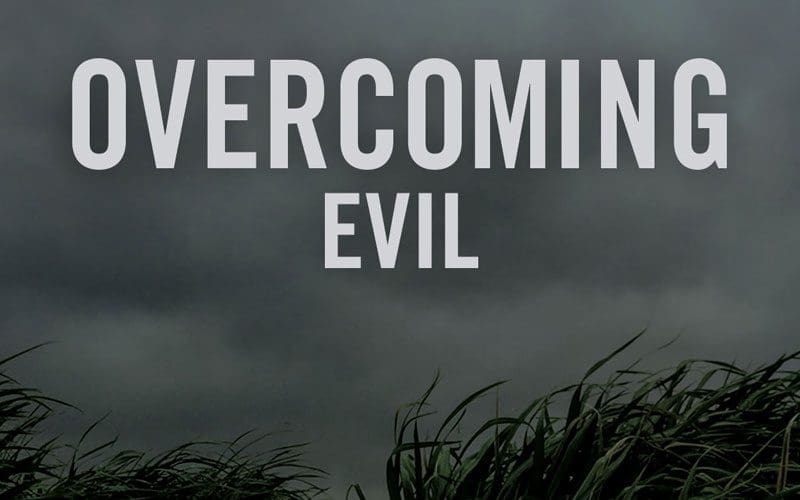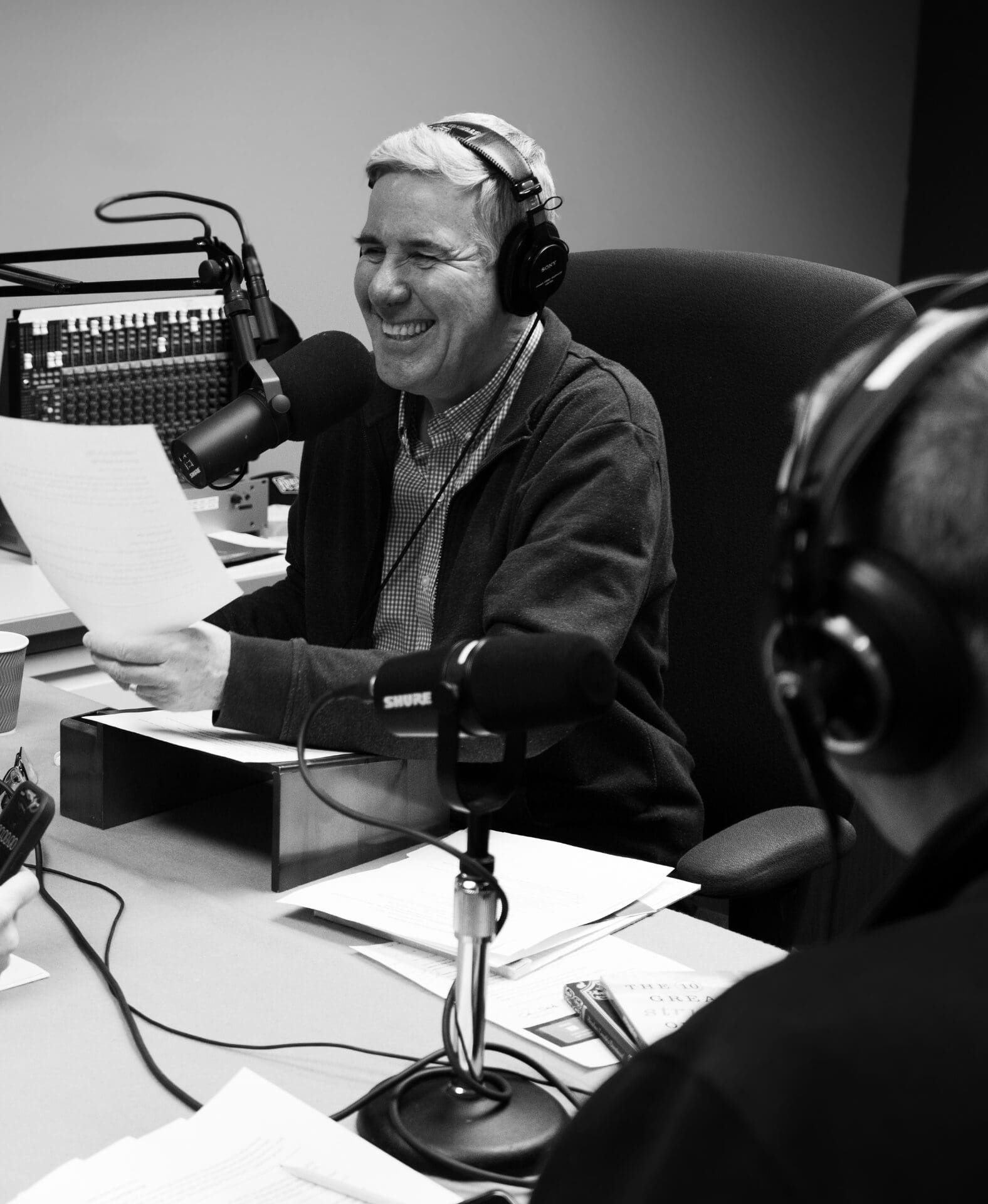Rejoice in hope, be patient in tribulation, be constant in prayer. (Romans 12:12)
In any walk of life, there will be times of great blessing and times of great difficulty. There will be times when you feel full of joy and there will be times when you may feel quite desperate.
We have seen that the book of Romans was written against the background of darkening skies for Christian believers in Rome. Nero had come to power – no Christian would have voted for Nero as their emperor. Evil was on the rise, and Paul says, “Do not be overcome by evil, but overcome evil with good” (12:21).
How are we to overcome evil with good? We saw that the place to begin is genuine love: “Let love be genuine” (12:9). Then last week we saw that God calls us to energetic engagement: “Do not be slothful in zeal, be fervent in spirit, serve the Lord” (12:11).
Today, I want you to see that God calls us to steady tenacity, sticking at it, persevering over the long haul: “Rejoice in hope, be patient in tribulation, be constant in prayer” (12:12). Several commentators quote a paraphrase that gives the sense or meaning of this verse:
In so far as we have cause to hope, let us be joyful;
In so far as we have cause of pain, let us hold out;
In so far as the door of prayer is open to us, let us continue to use it. [1]
Rejoice in Hope
In so far as we have cause to hope, let us be joyful!
Rejoice in hope! Remember that Paul is writing to Christians who within a few years of receiving this letter would endure a persecution in which some of them would be thrown to lions in a circus and others would be burned alive as torches in Nero’s garden.
The hope that Paul is speaking about here is not an optimistic feeling that things will get better. Paul was not naïve. He says, “Evil people… will go from bad to worse” (2 Tim. 3:13). He did not hold to an evolutionary view of human nature.
The hope that Paul speaks about here is what the New Testament calls “the hope,” the great and glorious hope that is ours in Christ. This hope is located, not in this world, but in the new world, into which Christ will bring us at the time of his second coming.
Paul says that we are “waiting for our blessed hope, the appearing of the glory of our great God and Savior Jesus Christ, who gave himself for us to redeem us from all lawlessness and to purify for himself a people for his own possession who are zealous for good works” (Titus 2:13-14). When you do not find joy in what is around you, find joy in what is ahead of you.
Paul has already spoken about this hope in Romans. “We rejoice in hope of the glory of God” (Rom. 5:2). “I consider that the sufferings of this present time are not worth comparing with the glory that is to be revealed to us” (Rom. 8:18). Then he speaks about the redemption of our bodies and he says, “In this hope we were saved” (Rom. 8:24).
Whatever our circumstances today, God says to us, “Rejoice in hope.” The question of course is: How are we to do that, especially when life is hard?
- Stop indulging false hopes.
Hope deferred makes the heart sick. (Prov. 13:12)
If you keep thinking that something is going to happen, and it doesn’t, you end up feeling sick. It breaks your heart. So don’t put yourself in that position. Don’t live your life in such a way that you set yourself up to be disappointed.
Think about the last hundred years of world history: The nineteenth century ended with extraordinary optimism – mankind was coming into “a golden age.” Then fourteen years into the 20th century we had the First World War. People said it will be “the war to end all wars.” If we can just get past this problem, we will come into a new and marvelous world.
It was only a matter of 20 years before the Second World War. And after that we had “the cold war” for 50 years, but then we ended the 20th century with the tearing down of the Berlin wall. That marked the end of the cold war and people spoke about “a new world order.” Less than 20 years later, we are immersed in a whole new kind of war, “the war on terror.”
People say, “When are we going to see the kind of world we had hoped for?” The answer is: You aren’t going to see it here! All visions of Utopia are doomed to failure in this world, whether they be Marxist, capitalist, or Islamic State. Stop indulging false hopes!
It is in the nature of the human spirit to think that we can redeem the world, but a brief look at world history shows us that we never have and we never will.
- Recognize short term uncertainty.
Listen to what God says in the letter of James, “Come now, you who say, ‘Today or tomorrow we will go into such and such a town and spend a year there and trade and make a profit’—yet you do not know what tomorrow will bring” (Jas. 4:13-14).
Here are people with plans: “Here is what I want to do: I am going to live in this or that city. I will to this college and pursue this career. We are going to marry and we are going to have children. We are going to plant a church. We would like to send out ten pastors, church planters, and missionaries every year!”
It is good to have plans, but remember, when you plan for the future, you don’t even know if you will be here tomorrow! “What is your life? For you are a mist that appears for a little time and then vanishes” (Jas. 4:15). Everything we hope to do in life depends on God’s grace and God’s strength, therefore the wise person says, “If the Lord wills, we will live and do this or that” (Rom. 4:15).
The short life we have in this world is very uncertain. God calls us to travel a winding path. None of us can see what is round the next corner – it may be a great trial, and it may be a great joy. We walk by faith, not by sight.
None of us knows for sure what will happen tomorrow, next week, next month, or next year. But here’s the thing: I don’t know what will happen tomorrow, but I do know the final outcome of my life.
- Rejoice in long term security.
Our blessed hope, the appearing of the glory of our great God and Savior Jesus Christ. (Tit. 2:13)
There is a piece by poet and journalist Steven Turner which I quote in part:
In heaven there will be no policemen, because there will be no crime.
There will be no soldiers, because there will be no war.
There will be no doctors, no surgeons, no nurses.
There will be no prison wardens, security guards, undertakers,
insurance salesmen, judges, watch-makers, fire-fighters, evangelists, gossip columnists, prostitutes or ambulance drivers. [2]
Sin will be no more. It will not be in you and it will not be around you. Never again will you grieve your Savior. You will be a joy to him and he will be a joy to you forever.
You will serve the Lord as you always wished you could. Never again will you be tired, weary or discouraged. You will explore the joys of the new earth freed at last from the curse – no floods or raging fires, no storms, earthquakes or mudslides. You will enjoy the blessings of a world where every person truly loves his sister and brother – no violence, no hatred, no fear.
You will enjoy this life in a resurrection body (modeled after the resurrection body of Jesus), in which the dark cloud of depression can never cast its shadow over you, the strong pull of temptation will never rise from within you, and the sharp anguish of pain will never torment you. You will be at home and at peace in this body.
Right now we sometimes groan inwardly. That is why we yearn as we wait for the redemption of our bodies. But it was in this hope that we were saved (Rom. 8:23-24). Old regrets that have haunted you will be gone forever. All tears will be wiped from your eyes. There will be no death, no mourning, no crying, and no pain.
And then you will see the King in his beauty. Your eyes shall behold him. In your flesh, you shall see God, and in his presence you will find fullness of joy.
Be Patient in Tribulation
In so far as we have cause of pain, let us hold out! We don’t often use the word ‘tribulation.’ The word means to be crushed, pressed, squeezed, stressed, burdened, or troubled.
If your hope in life is in this world, then when your life in this world is crushed, your hope will be crushed with you. But when your hope is in another world, then when you are crushed in this world, you will be patient. You will have the capacity to endure it with patience. You will be able to say with Abraham, “I am looking for a better city whose builder and maker is God.” Rejoicing in hope makes it possible for you to be patient in affliction.
These words, “Be patient in tribulation,” remind us that there will be seasons of life in this world that you simply have to endure. Paul speaks of a season in his life where he was utterly unbearably crushed (2 Cor. 1:8)! He said, “We gave up hope of life itself. We thought it was the end.” You may be able to identify a time like this in your own life.
What does God require of you at such a time? God does not say, “Make sure that you have a vibrant testimony of what I am doing in your life. Make sure you are able to tell everybody that you are doing just fine.” No, when you are utterly and unbearably crushed, God says, “Be patient. Hang in there. Hold steady. Stay the course.”
You see this patience in the example of Job.
Job experienced extraordinary trouble – loss of money, loss of property, loss of livelihood, and loss of his family. His wife said to him, “Why don’t you just curse God and die. Why don’t you just give up on God? Look at what he has allowed in your life.”
But Job said, “I won’t do that.” Instead, he wept, he prayed, he struggled, and he endured. And in the end, he came to know God in a way that he had never known him before. “I had heard of you by the hearing of the ear, but now my eye sees you” (Job 42:5).
You see the same patience in the example of William Carey.
Carey, a young minister in the 1700’s, was once arguing the case for sending missionaries overseas, when an older minister said, “Young man, sit down! You’re an enthusiast. When God pleases to convert the heathen, he’ll do it without consulting you or me.”
That provoked Carey, and he wasn’t one to sit down, so he wrote a book called, An Enquiry into the Obligations of Christians to Use Means for the Conversion of the Heathens. The ‘means’ of course were that we should pray, and that we should go, and proclaim the gospel.
Carey didn’t just talk about it, he did something. Carey organized a missionary society and at its first meeting in 1792, when he spoke, he coined a wonderful phrase: “Expect great things from God; attempt great things for God.” Within a year, he sailed to India, where he served for more than 30 years.
William Carey learned Bengali and he began translating the Bible. Soon after, he contracted malaria, his five year old son Peter died, and his wife became mentally ill. The reward for that lady in heaven is beyond what I can imagine.
Carey was patient in tribulation. He just kept going, and in the end, he (and those who joined him) translated the Bible into India’s top six languages, and he translated parts of the Bible into 209 other languages and dialects. [3]
William Carey also laid the foundations for the abolition of infanticide, widow burning, and assisted suicide. He inspired the next generations of missionaries who included, in the years that followed: David Livingstone, Adoniram Judson, and Hudson Taylor.
Late in his life, Carey said to his nephew that if anyone should write his biography, “If he gives me credit for being a plodder he will describe me justly. Anything beyond that will be too much. I can plod. I can persevere in any definite pursuit. To this I owe everything.”
Any good that you achieve in life will depend on you hanging in, plodding on, keeping the faith, and enduring sorrow and loss through the times when you could easily give up. Be patient in tribulation! You do that as you are joyful in hope, not joyful in what is around you, but in what is ahead of you.
Be Constant in Prayer
In so far as the door of prayer is open to us, let us continue to use it!
There is more here than praying once in a while when you feel the need. Make prayer the habit and the pattern of your life. And we do this in the light of God’s mercies (Rom. 12:1).
The more you believe that God is merciful, the more you will be drawn to come to him in prayer. This is the great argument in Hebrews 4. We have a merciful High Priest: Jesus, the Son of God. He knows what it is to suffer. He is able to sympathize with us because he has been through it himself. Therefore let us come confidently to the throne of grace (Heb. 4:16).
What a friend we have in Jesus, all our sins and griefs to bear
What a privilege to carry, everything to God in prayer
O what peace with often forfeit, O what needless pain we bear
All because we do not carry, everything to God in prayer. [4]
A Question, a Statement, and an Invitation
Question: Do you have what it takes to live in this world? Do you have a hope in which you can rejoice? Do you have a patience with which you can endure? Do you know the help of God on whom you can call? Because all of this is offered to you by God in Jesus Christ!
Statement: Your way of life will show where your hope lies.
Earlier this week, I set myself the task of answering this question: If my hope was mainly in this world, what would I do? What changes would I make? What would I do differently if my hope was mainly in this world?
I came up with four answers, and I am sure you can come up with more. If my hope was mainly in this world…
i. I would take more time off.
I would slacken the pace. I would not work so hard. I would focus more attention on all of the things I want to do in this world, and I would live with the constant feeling that I am running out of time.
ii. I would give less.
If my hope was mainly in this world, with all the things that I want to do, I need all the money I can possibly get to do them. The natural result of that would be to give less.
iii. I would grieve more.
If my hope was in this world, then anything lost in this world would be an ultimate and an irreversible loss.
iv. I would feel the need to seek my own vindication.
If my hope was mainly in this world, then this world would be the only place where things that are wrong could be put right.
I looked at my list and here is what was so striking to me: These are precisely the issues that Paul draws out in Romans 12! Do not be slothful in zeal. Contribute to the needs of the saints. Be patient in tribulation. Never avenge yourselves, but leave it to the wrath of God.
When your hope is in Jesus Christ, and in all that he holds in store for you, your hope will touch and change every area of your life! So here is the invitation:
Invitation: Place all your troubles in the hands of Jesus Christ and look in hope to him.
Rejoice in hope, be patient in tribulation, be constant in prayer (Rom. 12:12). If you do, you will not be overcome by evil. You will overcome evil with good.
[1] This is attributed to Hofmann and is cited by W. H. Griffith Thomas, St. Paul’s Epistle to the Romans, p. 341, Eerdman’s, 1946.
[2] Steve Turner, from the poem, In Heaven, 1992.
[3] Cited in Christianity Today article. https://www.christianitytoday.com/2008/08/william-carey/
[4] Joseph M. Scriven, from the hymn, What a Friend We Have in Jesus, 1855.







